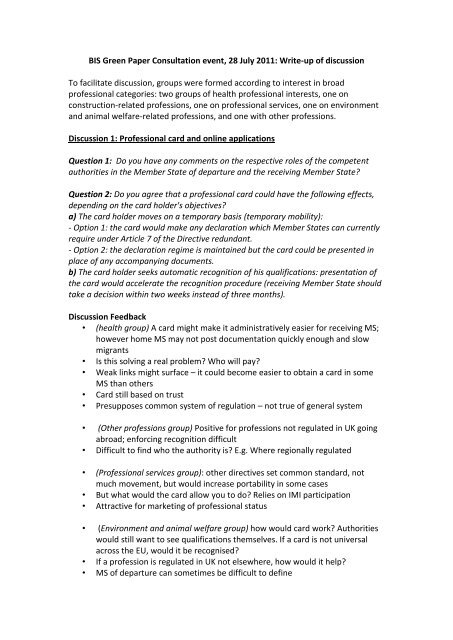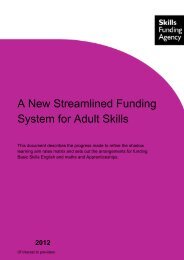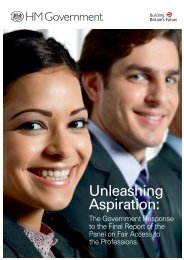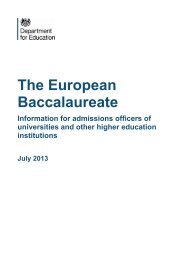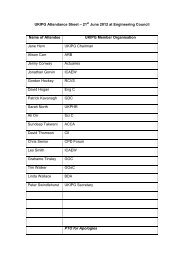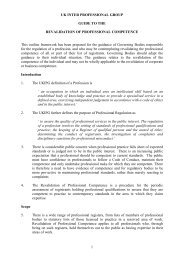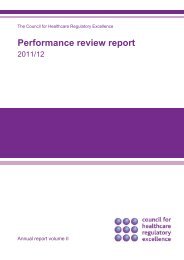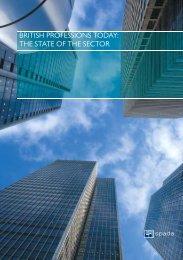Main Green Paper questions for discussion - ukipg
Main Green Paper questions for discussion - ukipg
Main Green Paper questions for discussion - ukipg
You also want an ePaper? Increase the reach of your titles
YUMPU automatically turns print PDFs into web optimized ePapers that Google loves.
BIS <strong>Green</strong> <strong>Paper</strong> Consultation event, 28 July 2011: Write-up of <strong>discussion</strong>To facilitate <strong>discussion</strong>, groups were <strong>for</strong>med according to interest in broadprofessional categories: two groups of health professional interests, one onconstruction-related professions, one on professional services, one on environmentand animal welfare-related professions, and one with other professions.Discussion 1: Professional card and online applicationsQuestion 1: Do you have any comments on the respective roles of the competentauthorities in the Member State of departure and the receiving Member State?Question 2: Do you agree that a professional card could have the following effects,depending on the card holder's objectives?a) The card holder moves on a temporary basis (temporary mobility):- Option 1: the card would make any declaration which Member States can currentlyrequire under Article 7 of the Directive redundant.- Option 2: the declaration regime is maintained but the card could be presented inplace of any accompanying documents.b) The card holder seeks automatic recognition of his qualifications: presentation ofthe card would accelerate the recognition procedure (receiving Member State shouldtake a decision within two weeks instead of three months).Discussion Feedback• (health group) A card might make it administratively easier <strong>for</strong> receiving MS;however home MS may not post documentation quickly enough and slowmigrants• Is this solving a real problem? Who will pay?• Weak links might surface – it could become easier to obtain a card in someMS than others• Card still based on trust• Presupposes common system of regulation – not true of general system• (Other professions group) Positive <strong>for</strong> professions not regulated in UK goingabroad; en<strong>for</strong>cing recognition difficult• Difficult to find who the authority is? E.g. Where regionally regulated• (Professional services group): other directives set common standard, notmuch movement, but would increase portability in some cases• But what would the card allow you to do? Relies on IMI participation• Attractive <strong>for</strong> marketing of professional status• (Environment and animal welfare group) how would card work? Authoritieswould still want to see qualifications themselves. If a card is not universalacross the EU, would it be recognised?• If a profession is regulated in UK not elsewhere, how would it help?• MS of departure can sometimes be difficult to define
• (second Health group)– a plastic card would be problematic; making IMIstronger would help, but the jury is out on the card• The card might add value <strong>for</strong> the temporary provision of services, though thetemporary movement of workers can cause problems in some professions• Noted the Lords inquiry on health professions and the professionalqualifications Directive.• A type of card already exists <strong>for</strong> nurses, but it may be removed because ofproblems it is facing• (Construction group): Possibly some benefits <strong>for</strong> some people; not in mostcontexts. Sectoral professions already appear to have mechanisms• Overlapping professions, different regulations etc. cause complications; howoptional would the card be? Important that it is optional <strong>for</strong> profession andprofessional• The problem is obstruction in the host state, not so much in<strong>for</strong>mation:authorities are likely to want to revisit in<strong>for</strong>mation about the professional,and will not be persuaded by a card.• (General <strong>discussion</strong>): The Commission’s position has moved on this -European Parliament also has a major influence• The proposals <strong>for</strong> a card have not been proposed by the Commission’ssteering group. Each scenario could work through IMI without the need <strong>for</strong> acard [PS: this refers to the PPT diagrams used in Mr Tiedje’s presentations]• A professional card might help where it is very difficult to get recognised inpractice, e.g. <strong>for</strong> ski instructors, though their qualifications have broadly beenagreed.• Automatic recognition processes should be easy without a card• General system: what if a national authority doesn’t recognise the card? i.e.some Member States issue the card but not others.Discussion 2: Changes in the General SystemQuestion 9: Would you support the deletion of the classification outlined in Article 11(including Annex II)? (Please give specific arguments <strong>for</strong> or against this approach).Question 10: If Article 11 of the Directive is deleted, should the four steps outlinedabove be implemented in a modernised Directive? If you do not support theimplementation of all four steps, would any of them be acceptable to you? (Pleasegive specific arguments <strong>for</strong> or against all or each of the steps.)• (Construction group) – Q9 – Article11 useful mechanism, no need to removeit; this would make Q10 irrelevant• (Second Health group): Art 11: effects unclear, more people would comeunder Gen system. CION study on use of EQF yet to be published – this willhave an impact. [PS: This refers to the ‘Educational Re<strong>for</strong>ms’ Study]
• (environment and animal welfare) no consensus: the proposal appliessomething too general <strong>for</strong> specific professions.• (Prof services) –benchmarking to EQF may not work <strong>for</strong> some professions• (Other professions) – article 11 can be very helpful if en<strong>for</strong>ced, but it isquestionable whether it is en<strong>for</strong>ced?• Art 11 however seems more geared towards traditional styles of learning• (Health) – unintended consequences of Q9?• Greater transparency needed of qualifications, removal of levels makescomparison harder• Tension with Q10 – compensation measures harder to apply if authoritiescan’t compare qualifications(General <strong>discussion</strong>)• Most evaluation reports, produced at the end of last year as part of thereview of the Directive, found the education levels useful.• General system as applying to automatic recognition professions should dealwith exceptional cases. The new proposal opens this up and changes thefocus in a problematic way• Many professions are not aligned to EQF anyway. International <strong>for</strong>ums <strong>for</strong>particular professions are better placed to look at what the training standardsshould be. Trainees can be at that stage <strong>for</strong> a long time• Concerns about lowering standards by opening up the General System,undermining public confidence• A problem <strong>for</strong> the UK is the different education system, e.g. part-time andcompressed degrees. Duration-based training is not the best measure ofcompetence. [PS: Discussion was in context of current HE White <strong>Paper</strong>proposals]Question 11: Would you support extending the benefits of the Directive to graduatesfrom academic training who wish to complete a period of remunerated supervisedpractical experience in the profession abroad? (Please give specific arguments <strong>for</strong> oragainst this approach.)• (Construction group): support graduate mobility, this happens anyway• (Second Health group): Q11: mobility of this kind would not work in nursingbecause of differences in regulation. May work <strong>for</strong> specialist doctors, but not<strong>for</strong> basic training. There could be benefits, but only post-registration as adoctor with basic training, i.e. <strong>for</strong> postgraduate qualifications.• (environment and animal welfare group): differences in training can be anissue – though vets can already come here to complete practical training• (professional services): Different structures to training means graduates maynot be fit <strong>for</strong> purpose at the same stage in the UK (e.g. knowledge of differenttax structures)• (Health): Q11 – will you miss a key element of training if you do differentparts in different countries?
• Would such an extension fall outside scope of Directive?• In medicine, one can already enter foundation year training from abroad; butthe Directive’s legal base currently only covers recognition of completedstudies.Discussion 3: Partial access and temporary mobilityQuestion 3: Do you agree that there would be important advantages to inserting theprinciple of partial access and specific criteria <strong>for</strong> its application into the Directive?(Please provide specific reasons <strong>for</strong> any derogation from the principle.)• (Health group 2): Partial access is in case law, needs some recognition andclear boundaries in the Directive• Safety an important consideration which needs defining• (environment and animal welfare group): partial access needs recognising,but in what situations? Specialist special needs teachers one example• Communication of what professional is restricted to a problem• Safety: public health risks need considering• (Other professions): partial access can benefit some professions, differentregulation / specialisations; partial recognition in the UK could work in someareas• (Health): better to have partial access in the Directive than case law; clearguidance needed on public safety; derogation <strong>for</strong> health professions might bea solution.• Specialists coming to the UK on the basis of partial access would lead toconfusion as to what they are able to practise• (Construction): partial access clearly has value, but circumstances need to beclarified. Specialism in one state coming to a state where broadly regulated –how to deal with this? Some Member States have created new professionaltitles specifically <strong>for</strong> this purpose (only <strong>for</strong> <strong>for</strong>eign nationals) – not desirable.• More detail as to how it could be applied, easier just to allow full access ornot allow itQuestion 7: Do you agree that the requirement of two years' professional experiencein the case of a professional coming from a non-regulating Member State should belifted in case of consumers crossing borders and not choosing a local professional inthe host Member State? Should the host Member State still be entitled to require aprior declaration in this case? (Please give specific arguments <strong>for</strong> or against thisapproach.)Question 8: Do you agree that the notion of "regulated education and training" couldencompass all training recognised by a Member State which is relevant to aprofession and not only the training which is explicitly geared towards a specificprofession? (Please give specific arguments <strong>for</strong> or against this approach.)
• (Health group 2): the requirement <strong>for</strong> 2 years’ experience is helpful to ensurepublic confidence, even if the experience was in another system• (environment and animal welfare group) There are issues with temporarymobility. 2 years’ experience does give some assurance, especially whereprofession is not regulated elsewhere.• (Professional services): Years of experience are not necessarily a goodmeasure of competence• Issues remain with movement between unregulated and regulated countries• (Other professions): 2 years’ experience: how is this measured? (e.g.seasonal) If you need certain (e.g. local) experience – how do you acquire• How do you reach the standard if it’s unclear what it means, there is no listdefining the standard in some countries.• (Health): Temporary mobility – lack of definition, clarity needed <strong>for</strong> otherterms in the current Directive too• (Construction): For some professions, it would be disproportionate to ask aprofessional to register if the consumer is satisfied?• Q8 –Opening up regulated education might open the floodgates in terms ofwhat professional provides, especially if it is clear across the EU what isrequired <strong>for</strong> a profession. It is Common to have varied qualifications <strong>for</strong> oneprofession(General <strong>discussion</strong>)• Professionals who accompany consumers might stay – existing provisionscover this already. It is also unclear what is meant by temporary andoccasional service provision.• Finding the Point of Single Contact (Services Directive) is a problem in manycountries! Such portals have to be user-friendly, or else legislation will beignored• A system which works effectively across the board would solve many of theseproblems• Temporary registration needs to be made accessible by the authorities; insome countries it isn’t.Discussion 4: Collaboration between AuthoritiesQuestion 12: Which of the two options <strong>for</strong> the introduction of an alert mechanism <strong>for</strong>health professionals within the IMI system do you prefer?
Option 1: Extending the alert mechanism as <strong>for</strong>eseen under the Services Directive toall professionals, including health professionals? The initiating Member State woulddecide to which other Member States the alert should be addressed.)Option 2: Introducing the wider and more rigorous alert obligation <strong>for</strong> MemberStates to immediately alert all other Member States if a health professional is nolonger allowed to practise due to a disciplinary sanction? The initiating Member Statewould be obliged to address each alert to all other Member States.)• (Other professions group): Problems if profession doesn’t have a competentauthority, problems defining a profession, how can it work <strong>for</strong> unregulatedprofessions• (Professional services): IMI is not always used because of the low volume oftraffic. There is room <strong>for</strong> improvement, as it is sometimes quicker to makecontact outside IMI.• Alerts: there are other regulatory means to do this <strong>for</strong> other professions• (Environment and animal welfare): IMI is slow, some problems• No function to send general question to all Member States – alert notpossible• Option 2 <strong>for</strong> alerts is much better, sending a message to all 27 MemberStates.• Alerts should apply to more broadly than narrowly defined healthprofessionals• (Health group 2): alert mechanism is needed, IMI must be mandatory• UK health regulators have alerts in place already• Difficult to define what is meant by fitness to practise: Criminal convictionsdiffer in different MS.• When should alerts be mandatory? When a person is suspended/removedfrom register; or also when person is under investigation?• (Construction group) IMI not working <strong>for</strong> engineers? Feeling that this is asystem to solve what is at root a human problem. IMI depends on users• (Health): option 2 is best <strong>for</strong> an alert system, alerts should cover changes to aprofessional’s registration but also other concerns• Other Directives: need to clarify how these interact.• Data protection prevents sharing certain in<strong>for</strong>mation in some MS, EU Dataprotection Directive is also being reviewed, and this needs tying in.(General <strong>discussion</strong>):• Danger of too much in<strong>for</strong>mation coming in through alerts. E.g. HPC has 600-700 fitness to practice hearings per year – there is a balance to be struck.• Differences between net exporting and net importing professions bringsdifferent perspectives: UK has more inward movement in many professions.
• Focus groups: mandating cooperation between authorities / professionalgroups in certain areas, could be done through a different Directive?Cooperation is needed, not necessarily focus groups, but in a structured way• En<strong>for</strong>cement is difficult; changing the culture is more important. E.g. Mutualevaluation – peer judgment on different ways of working, could influencepractice.• Sharing best practice through in<strong>for</strong>mal networks can be helpful, butin<strong>for</strong>mality means that problem countries don’t attend. Encouragement byCommission is needed without excessive <strong>for</strong>malising of focus groups.• IMI and professional card: use of IMI as a repository of in<strong>for</strong>mation could beproblematic?Discussion 5: Other QuestionsLanguage requirementsQuestion 13: Which of the two options outlines above do you prefer?Option 1: Clarifying the existing rules in the Code of Conduct;Option 2: Amending the Directive itself with regard to health professionals havingdirect contact with patients and benefiting from automatic recognition.• Where there are health and safety impacts of profession, language tests canbe needed; but to what level? What is proportionate – different <strong>for</strong> differentprofessions• (environment and animal welfare) There is a need <strong>for</strong> language testing(especially vets), on case by case basis? Concern about only having one-offlanguage testing – can employer also test?• (Health group 2) – when could you do testing? Not straight<strong>for</strong>ward. E.g. HPC– no problems under current regime, evidence needed. E.g. Boots –employers do test (<strong>for</strong> some), reputational impact needs to be considered• Regulator needs to check fitness to practise, but need to be careful to beproportionate. Case by case testing <strong>for</strong> self-employed professionals. One-offtest only? Clarity from the Commission would help.• UK SI implementing Directive does not mention current Article 53 (onlanguage testing)• Other UK laws have an impact, which leads to misin<strong>for</strong>mation problems.CPDQuestion 15b) Is there a need <strong>for</strong> the Directive to address the question of continuingprofessional development more extensively?(Construction): CPD would be too complicated to include in the Directive, though wewould want to encourage its use. Perhaps it is outside the scope of the Directive,since the Directive is about registration not professional practice?
Annex IV• Should not be a back door <strong>for</strong> entry to a profession. Experience is not alwaysequal to competenceThird country qualificationsQuestion 24:Do you consider it necessary to make adjustments to the treatment of EU citizensholding third country qualifications under the Directive, <strong>for</strong> example by reducing thethree years rule in Article 3 (3)? Would you welcome such adjustment also <strong>for</strong> thirdcountry nationals, including those falling under the European Neighbourhood Policy,who benefit from an equal treatment clause under relevant European legislation?(Please give specific arguments <strong>for</strong> or against this approach.)- (Vets) – would not want to reduce the requirement <strong>for</strong> three years’experience.- (Health): Forum shopping is a danger. If three years experience has not beenacquired, applicants should come under the general system.Common plat<strong>for</strong>msQuestion 4: Do you support lowering the current threshold of two-thirds of theMember States to one-third (i.e. nine out of twenty seven Member States) as acondition <strong>for</strong> the creation of a common plat<strong>for</strong>m? Do you agree on the need <strong>for</strong> anInternal Market test (based on the proportionality principle) to ensure a commonplat<strong>for</strong>m does not constitute a barrier <strong>for</strong> service providers from non-participatingMember States? (Please give specific arguments <strong>for</strong> or against this approach.)(Professional services): Good idea, though danger that countries outside plat<strong>for</strong>mcould face problemsReducing regulated professionsQuestion 5: Do you know any regulated professions where EU citizens mighteffectively face such situations [excessive qualifications requirements]? Pleaseexplain the profession, the qualifications and <strong>for</strong> which reasons these situationswould not be justifiable.(Professional services) Goes against other EU initiatives; danger <strong>for</strong> customers andmarket?(Other professions) – However, hundreds of professions only regulated in onecountry


